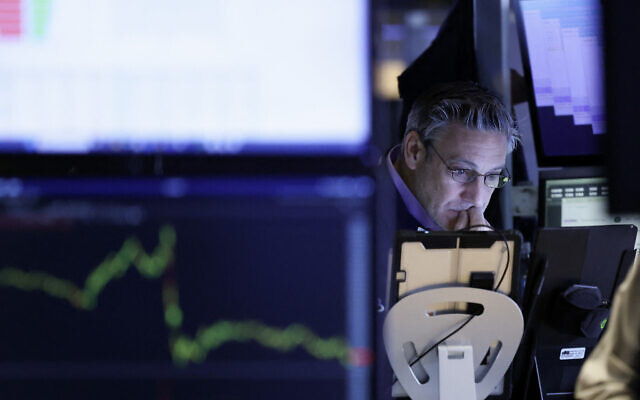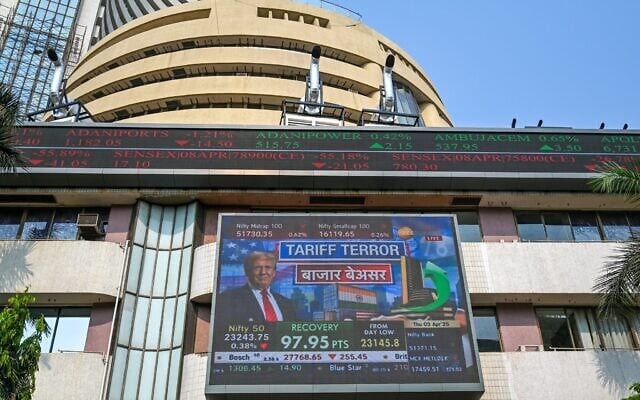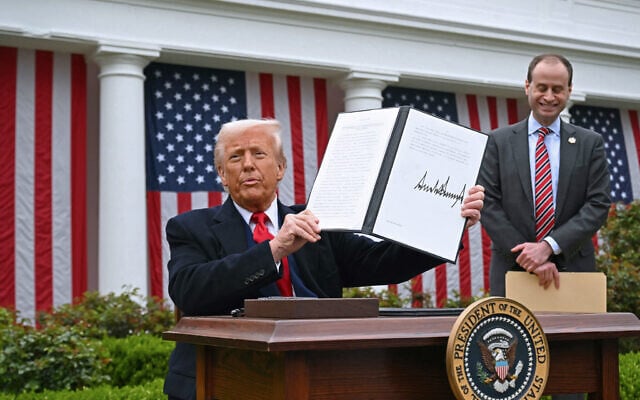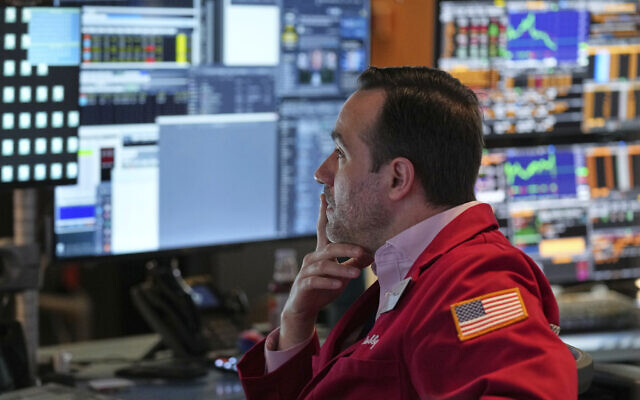


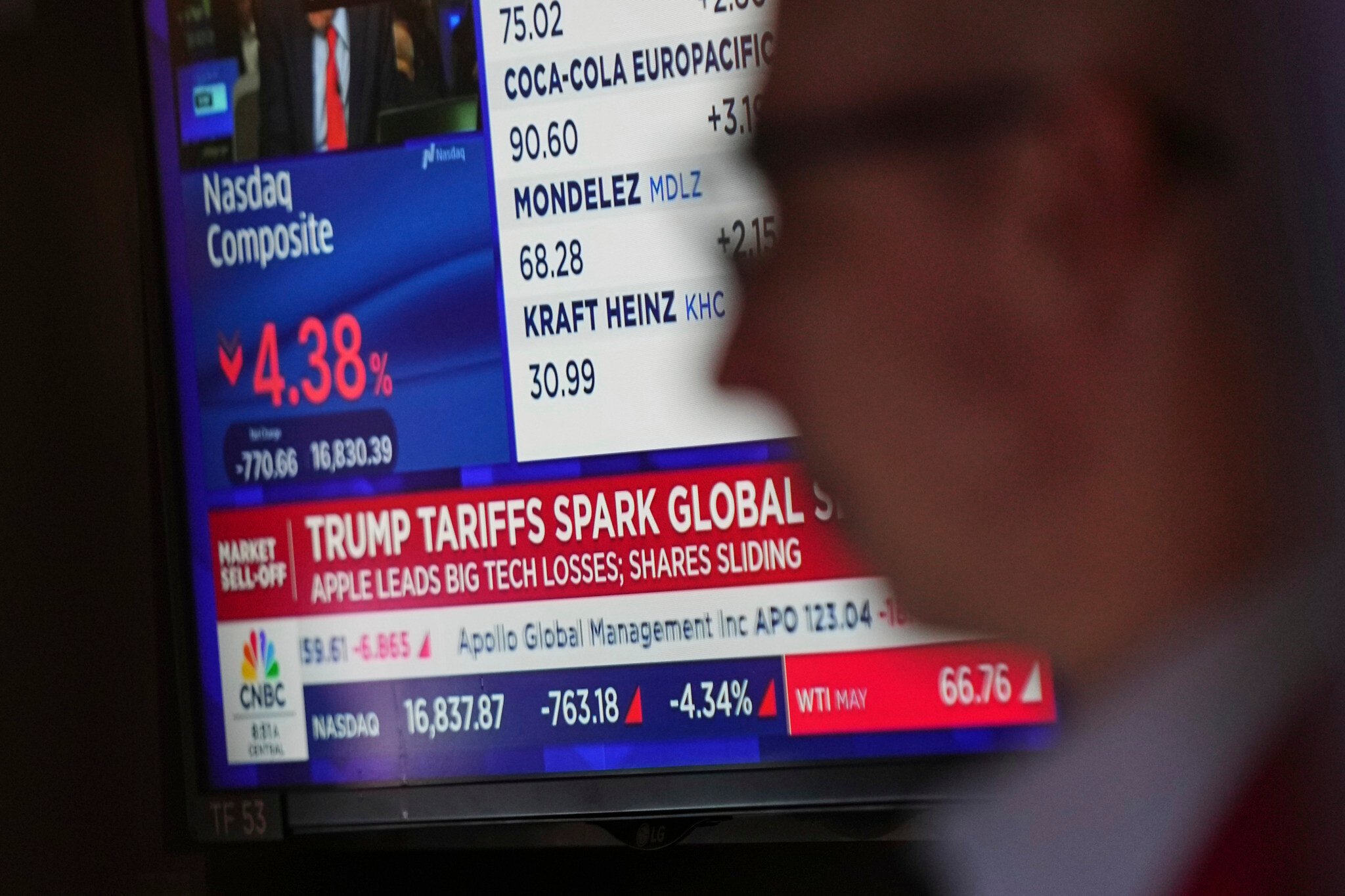
Wall Street stocks plunged in early trading Thursday, joining a global equity selloff after US President Donald Trump’s latest tariff announcement exacerbated worries about a trade war and global economic downturn.
The S&P 500 was down 4 percent in morning trading, worse than the drops for other major stock markets. The Dow Jones Industrial Average was down 1,520 points, or 3.6%, as of 10:10 a.m. Eastern time, and the Nasdaq composite was 4.0% lower.
In Israel, the Tel Aviv Stock Exchange’s flagship TA-35 index fell 0.62% in trading, while the benchmark TA-125 dropped 0.85%.
Fears have flared globally about the potentially toxic mix of higher inflation and weakening economic growth that tariffs can create.
Everything from crude oil to Big Tech stocks to the value of the US dollar against other currencies fell Thursday. Even gold, which has hit records recently as investors sought something safer to own, pulled lower.
Some of the worst hits walloped smaller US companies, and the Russell 2000 index of smaller stocks dropped more than 5% into what is called a “bear market� after losing more than 20% from its record.
Worries about possible stagflation knocked down stocks across industries, leading to drops for four out of every five stocks that make up the S&P 500.
Especially hard-hit sectors included apparel, where Nike, Macy’s and Gap all suffered double-digit drops following fresh new large levies on China, Malaysia and other countries that are home to textile infrastructure. In Tel Aviv, Israel’s Delta-Galil, which owns a number of clothing brands, fell nearly 10%.
Apple, which relies heavily on Chinese manufacturers for its products, was another big loser, sinking 8.2 percent. Amazon fell 6.9 percent, while Nvidia lost 4.9 percent.
Best Buy fell 16.1% because the electronics that it sells are made all over the world. United Airlines lost 12.7% because customers worried about the global economy may not fly as much for business or feel comfortable enough to take vacations. Target tumbled 11.4% amid worries that its customers, already squeezed by still-high inflation, may be under even more stress.
In stock markets abroad, indexes fell sharply worldwide. France’s CAC 40 dropped 3%, and Germany’s DAX lost 2.3% in Europe.
Japan’s Nikkei 225 dropped 2.8%, Hong Kong’s Hang Seng lost 1.5% and South Korea’s Kospi dropped 0.8%.
Investors worldwide knew Trump was going to announce a sweeping set of tariffs late Wednesday, and fears surrounding the move had already pulled the S&P 500 10% below its all-time high last month. But Trump still managed to surprise them with “the worst case scenario for tariffs,� according to Mary Ann Bartels, chief investment officer at Sanctuary Wealth.
Trump announced a minimum tariff of 10% on imports, with the tax rate running much higher on products from certain countries like China and those from the European Union. It’s “plausible� that the tariffs altogether, which would rival levels unseen in roughly a century, could knock down US economic growth by 2 percentage points this year and raise inflation close to 5%, according to UBS.
Such a hit would be so frightening that it “makes one’s rational mind regard the possibility of [the tariffs] sticking as low,� according to Bhanu Baweja and other strategists at UBS.
Wall Street had long assumed Trump would use tariffs merely as a tool for negotiations with other countries, rather than as a long-term policy.
But Wednesday’s announcement may suggest Trump sees tariffs more as helping solve an ideological goal — wresting manufacturing jobs back to the United States, for example — than just an opening bet in a poker game.
If Trump follows through on his tariffs, stock prices may need to fall much more than 10% from their all-time high in order to reflect the global recession that could follow, along with the hit to profits that US companies could take. The S&P 500 is now down about 11% from its record set in February.
“Markets may actually be underreacting, especially if these rates turn out to be final, given the potential knock-on effects to global consumption and trade,� said Sean Sun, portfolio manager at Thornburg Investment management, though he sees Trump’s announcement on Wednesday as more of an opening move than an endpoint for policy.
Jason Schenker of Prestige Economics said in a note that the Trump administration could later drop the levies after negotiations on trade or other political priorities.
“We see the Trump administration’s policies as a manifestation of outcome-focused economic Realpolitik rather than process-focused diplomacy,” Schenker said. “Recession and stagflation risks are rising with tariff uncertainty.”

